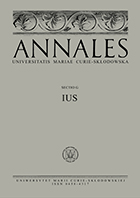Demokracja a liberalizm – uwagi z perspektywy XXI w.
Democracy and Liberalism – Some Remarks in the Point of View of the 21st Century
Author(s): Maria ZmierczakSubject(s): Political Sciences, Political economy
Published by: Wydawnictwo Naukowe Uniwersytetu Marii Curie-Sklodowskiej
Keywords: rotten liberalism; economic liberalism; political liberalism; liberal democracy; sovereign democracy;
Summary/Abstract: Nowadays the term “liberalism” is more and more used in political debates together with pejorative adjectives like “rotten”, “passed” and others. Instead of “liberal democracy” we hear about “sovereign democracy”, “independent democracy” and of course “national democracy”. Looking for the roots of such development, the author sees one of them in the identification of liberal ideas with the liberal economy. Although the deepened studies show, that even the most prominent liberals never were so orthodox like the libertarians, among them especially Hans-Hermann Hoppe, for whom no liberty is possible without absolute freedom of property, commerce and production. The idea is false, taking into account the liberals like John Maynard Keynes, even John Stuart Mill or Leonard Trelawney Hobhouse. The second misunderstanding is in the notion of democracy. Nowadays the most popular idea is that democracy means simply the political majority. That is the point in which the liberals were always very cautious, beginning with Benjamin Constant, Alexis de Tocqueville and John Stuart Mill. The liberals accepted democracy, but – according to the famous words of Mill – defined as the rule of majority, but with respect of minorities. It is clear, that this role of liberalism is nowadays in retreat. Democracy is often meant and understood as the sovereignty of the people, according to the words of Jean-Jacques Rousseau “unlimited, unalienable and indivisible”, and means freedom of nation and not freedom of individual. The historical experience shows that such “unlimited will of the people” was used as a veil for the most horrific political systems. But on the other hand, it is clear that under authoritarian regimes, liberalism, especially political liberalism, becomes the point of gathering of the opposition, as the examples of II French Empire, of fascist Italy, German III Reich, and communist regime confirm.
Journal: Annales Universitatis Mariae Curie-Skłodowska, sectio G – Ius
- Issue Year: 66/2019
- Issue No: 1
- Page Range: 465-474
- Page Count: 10
- Language: Polish

